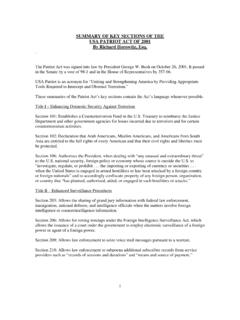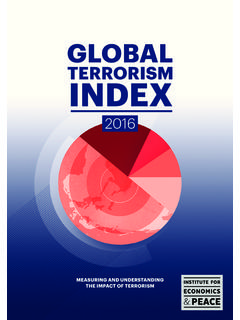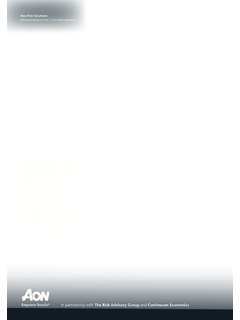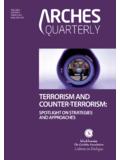Transcription of Introduction: A Short History of Terrorism in the United ...
1 Paper Presented at AMSS 36th ANNUAL CONFERENCE. Perils of Empire: Islamophobia, Religious Extremism and the New Imperialism . Cosponsored by The Department of Government and Politics University of Maryland, College Park, Maryland October 26 28. 2007. _____. Breach of Law, Breach of Security: A Muslim American Analysis of US Counterterrorism Policies . By: Alejandro J. Beutel*. (Program Assistant, Minaret of Freedom Institute, Bethesda, MD. Abstract: Since 9/11 debates on Terrorism and counterterrorism have been poorly informed. Fear and ideology rather than reason and facts have guided our policymakers'.)
2 Decisions, creating a dichotomy between liberty and security. As a result, the US. government has pursued policies that tend to be illegal, unethical and/or invasive. In this paper I argue that the dichotomy between civil liberties versus national security is unsubstantiated, but that the relationship between the two concepts is highly interdependent. I argue this point in my paper by beginning with a brief History of Terrorism and counterterrorism in the US prior to the September 11th attacks. Following that, I will use four case studies to examine current US. counterterrorism policies: torture in interrogations, racial profiling, the NSA.
3 Domestic surveillance controversy, and the use of FBI National Security Letters. Such policies not only erode civil liberties/human rights, but they also harm national security by obtaining dubious information via unethical means, diverting resources from real threats and eroding the important relations between law enforcement officers and ordinary citizens (particularly American Muslim communities). The paper concludes by offering a set of policy alternatives. *. I would like to thank Dr. Imad-ad-Dean Ahmad of the Minaret of Freedom Institute (MFI) for his patience, support and critical feedback on this paper.
4 I would also like to thank Michael German, National Security Counsel at the American Civil Liberties Union (ACLU) and former FBI agent, for his help through formal and informal discussions on liberty and security and his assistance in providing important information and clarification of concepts used in this paper. Finally I would also like to thank Iqbal Akhtar, intelligence analyst at the United States Northern Command (USNORTHCOM), for his help and support through informal discussions on Terrorism and geo-politics. The opinions offered in this paper are my own and do not necessarily represent views of Dr.
5 Ahmad, Mr. German, Mr. Akhtar, MFI, the ACLU, the FBI. or USNORTHCOM. Section I. A Definition of Terrorism and its Challenges Before beginning this paper, it is necessary to provide a definition of the word Terrorism . However this is no easy task. According to researchers Albert J. Jongman and Alex P. Schmid, there are at least 109 different definitions of 1. Terrorism . (The United States has at least three different definitions, between the Federal Bureau of Investigations [FBI], Department of State and Department of Defense.)2 Some analytical hurdles to overcome before arriving at a definition include: Terrorism vs.
6 Liberation . One man's freedom fighter is another man's terrorist. How is one to distinguish between the legitimacy of two different sides' agendas? Is it through the ideology or through the means? Both?3. Terrorism as a crime vs. war. Is it a criminal act or it is a type of warfare that needs to be conducted according to the law governing war?4. Targets. Who is considered to be a civilian? Are humans the only targets of 5. Terrorism ? State vs. non-state. State security apparatuses engage in Terrorism , like Iranian Revolutionary Guard Corps, as the Bush administration has argued, or the Israeli Defense Forces, as many Palestinians would charge?
7 Or is it simply limited to non-state actors?6. Ultimately trying to build a universal consensus for an objective definition of Terrorism is impossible. The fundamental problem with defining the term is that it is extremely subjective, shaped by ideology, politics and power. This is why 7. definitions of the term continue to change. Nevertheless, in order to provide analytical clarity of counterterrorism, for this paper I define Terrorism as: A criminal act by non-state actors that seeks to employ violence against unarmed human civilians, as defined by the Geneva 8. Conventions, for political purposes Section II.
8 A Short History of Terrorism in the United States and Its Responses Although the subject of Terrorism has always been and continues to be a hotly debated and widely interpreted topic, one thing that its historians and contemporary analysts agree upon is that it is not a new form of violence. One historian speculates that it may predate regular warfare because, the fighting of armies involves a certain amount of organization and sophisticated logistics that 9. primitive man did not have. Recorded historical evidence supports Terrorism 's origins at about 2,000 years with emergence of violent Jewish fanatical groups such as the Sicarii,10 however the term Terrorism itself was not coined until 1793-4.
9 During the French Revolution by Maximilien Robespierre. Interestingly, Robespierre's usage of the term was a positive one, and furthermore, he applied the term as a tactical instrument of the state, as opposed to a non-state The first recorded instance of what might be argued as Terrorism in America took place in 1622 when the Powhatan Native Americans attacked the Jamestown colony in 1622, killing 30% of its Although there were sporadic uprisings and rebellions in early United States History , the first terrorist organization after the creation of the American republic was the white supremacist organization, the Ku Klux Klan (KKK).
10 Formed in 1867, it was originally a non- violent social organization led by former Confederate general Nathan Bedford Forrest. However it soon turned to violence in 1868, murdering, beating up and intimidating black voters and white supporters of the Republican Party. Their attacks and intimidation were particularly effective in shaping voting patterns, help[ing] account for Georgia's [among other states'] quick redemption' and 13. return to conservative white Democratic control by late 1871. After a massive Federal crackdown involving suspension of Habeas Corpus, legal convictions of dubious constitutionality and tough anti-Klan laws during 1871-72, the KKK.




